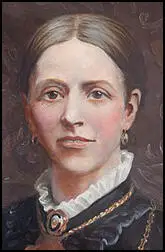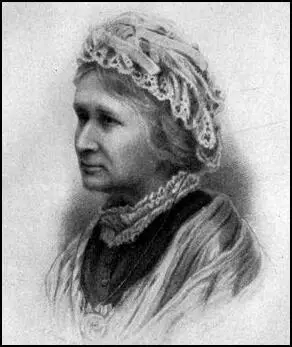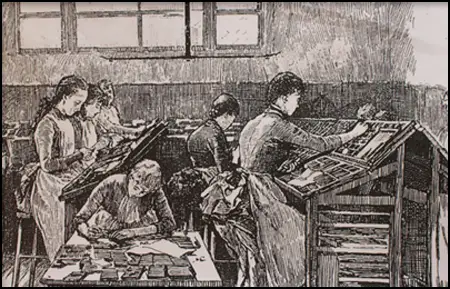Caroline Ashurst Biggs

Caroline Ashurst Biggs, the second daughter of Matilda Ashurst Biggs (1816–1866) and Joseph Biggs (1809–1895), was born in Leicester, on 23rd August 1840. Her three sisters were (1838-1905), Matilda (1857-1933) and Kate (1859-1901). Her father was a hosier and woollen goods manufacturer. (1)
Caroline's grandfather, William Henry Ashurst, a solicitor, was a Unitarian who was a member of the National Association for the Promoting of the Political and Social Improvement of the People and an associate of William Lovett, Robert Owen and George Holyoake. (2)
Under her mother's influence she developed at an early age a strong belief in the political and social emancipation of women. (3) In 1858, Joseph Cowen, became secretary of the Northern Reform Union, an organisation that demanded universal male suffrage, abolition of the property qualification and the secret ballot. Caroline wrote to Cowen: "I deeply regret that it (the Northern Reform Union) limits its desires of obtaining political rights… to men alone, in defiance of its motto ‘Taxation without Representation is Tyranny'… I do not feel inclined to become a member of any society which… is purely selfish in its object, and does not recognise the principle of justice and rights for all mankind." (4)
In 1861 Caroline Biggs, aged nineteen, was living with her parents at 12 Orme's Square, Paddington, London. Her father was employing 20 men and four boys. Also living in the house was her sister Elizabeth. The family employed three domestic servants: a cook, nurse and housemaid. (5)
Caroline Biggs was a strong opponent of slavery and she published a three-volume novel, White and Black: a Story of the Southern States (1862). which was praised by the Italian republican exile Giuseppe Mazzini, a close friend of the Biggs family. After her mother's death in 1866, Biggs moved to London, where she joined the small group of middle-class feminists, including Millicent Garrett Fawcett, that set up the first organized women's suffrage movement. (6)
London Society for Women's Suffrage
In 1867 Caroline Biggs and her friends formed the London Society for Women's Suffrage with the sole purpose of campaigning for women's suffrage. (7) Clementia Taylor was the driving force behind the formation of the London Society for Women's Suffrage. From the outset it was intended that this new society in London was to be part of a federated scheme. Taylor wrote that she was willing "to undertake the secretary-ship of the London Central Committee the centres all to be affiliated together and in constant correspondence with each other so that no work shall be repeated. I think different centres will be necessary for local actions - but no centre to take any important step without reference to all the other centres." (8)

It was reported that at a meeting of the London National Society for Women's Suffrage that took place at the Stamford Street Chapel on 6th April 1868. Henry Fawcett occupied the chair, and Thomas Hughes, M.P. and James Heywood, made speeches. "The chairman opened the proceedings by contrasting the condition of women in the various civilised countries of the earth. He combated the argument that women were intellectually inferior to men, and contended that, with equal opportunities, they had generally proved themselves on an equality with men. He entirely concurred in the object of the meeting." Thomas Hughes "spoke at some length respecting the present state of the laws affecting married women and the rights of property, which he contended, were in a most unfair and unsatisfactory state. He thought there was no likelihood of the law in this respect being improved until women had a direct influence in the representation." (9)
The first committee of the society included Clementia Taylor, Frances Power Cobbe, Millicent Garrett Fawcett, Katharine Hare, Eliza Keary and Margaret Bright Lucas. Other members included Helen Taylor, Lydia Becker, Barbara Bodichon, Jessie Boucherett, Emily Davies, Francis Mary Buss, Dorothea Beale, Anne Clough, Rhoda Garrett, Lilias Ashworth Hallett, Louisa Garrett Smith, Priscilla McLaren, Elizabeth Garrett, Alice Westlake, Catherine Winkworth and Kate Amberley. (10) The undermentioned have among others, joined the general committee: Florence Nightingale, John Russell, John Bowring, Robert Austruther, George Hadfield, George Croom Robertson and Edmund Beales joined the general committee of the London Society for Women's Suffrage. (11)
Caroline Ashurst Biggs was made assistant secretary of the London National Society for Women's Suffrage (NSWS), alongside Clementia Taylor, in 1867, a post which she held until 1871. According to Helen Blackburn, the author of Women's Suffrage: A Record of the Women's Suffrage Movement in the British Isles (1902): "Her (Caroline Biggs) ready pen, methodical work and untiring industry soon proved her an invaluable ally" (12)
The first public meeting organised by the London Society for Women's Suffrage was held in the Gallery of the Architectural Society in Conduit Street on 17th July 1869. The chair was taken by Clementia Taylor and the audience heard for the first time women speak from a London platform in the furtherance of their cause. The following year on 26th March 1870, another meeting was held, this time in the Hanover Square Rooms, again with Taylor in the chair. Among the speakers were Caroline Biggs, Millicent Garrett Fawcett, Katherine Hare, Harriet Grote, Helen Taylor, John Stuart Mill and Charles Wentworth Dilke. It was claimed by Jessie Boucherett that Biggs was "a rather indistinct speaker". (13)
In November 1871, Jacob Bright suggested at the annual general meeting of the Manchester Society for Women's Suffrage that greater pressure could be applied on members of the House of Commons by establishing a Central Committee for Women's Suffrage in London. The first meeting of this new group was held on 17th January 1872. The first executive committee included Caroline Biggs, Frances Power Cobbe, Priscilla Bright McLaren, Agnes Garrett and Lilias Ashworth Hallett. (14)
The Leicester Daily Mercury argued: "Her (Caroline Biggs) assiduous devotion to the cause never once flagged until the inroads of mortal disease, against which her indomitable spirit struggled to the last, forced her to lay aside her work. She was an eloquent and successful lecturer and speaker, and an able writer. Her energies were not limited to the women's suffrage movement." (15)
Barbara Leigh Smith Bodichon established one of the first feminist journals, The Englishwoman's Review in 1866. Its first editor was Jessie Boucherett, who saw it as a successor to the English Woman's Journal (1858–64). In 1871 Caroline Ashurst Biggs became editor. Women who contributed to the journal included Helen Blackburn, Mary Lowndes and Margaret Sackville. (16)
Society for the Promotion of the Employment of Women
The energies of Caroline Biggs were not limited to the women's suffrage movement. She was also active in the Society for the Promotion of the Employment of Women. (17) The society enlisted the support of Anthony Ashley Cooper, the Earl of Shaftesbury, who became the society's first president, and other members of the National Association for the Promotion of Social Science (18) Another important member was the Christian Socialist and legal scholar, John Westlake. (19)
The Society for Promoting the Employment of Women was based initially at 19 Langham Place. They began a law copying office, a school to train women as bookkeepers, clerks, and cashiers, and a register of employment. While such measures could clearly help only a few women of the middling classes, the pioneers regarded their innovations as experiments which prepared the ground for future change. (20)
The Society for Promoting the Employment of Women gained support for its efforts from The English Woman's Journal. The journal was published by a limited company. The main shareholders were Barbara Leigh Smith Bodichon and Emily Faithfull. The wealthy industrialist, Samuel Courtauld, a Unitarian, also invested in the venture. The editor was Bessie Rayner Parkes. (21)
The journal was published monthly and cost 1 shilling. It was used to discuss female employment and equality issues concerning, in particular, manual or intellectual industrial employment, expansion of employment opportunities, and the reform of laws pertaining to the sexes. The offices in Langham Place became a centre for a wide variety of feminist enterprises. These included a women's reading-room and dining club, and offices for the Society for Promoting the Employment of Women. (22)

On 25th March 1860, Emily Faithfull established the Victoria Press at Great Coram Street, London. She invested her own capital in the press and had the financial backing of another committee member of the Society for Promoting the Employment of Women. The Victoria Press printed The English Woman's Journal. The press employed at the outset women compositors, despite the trade restrictions practised by men, but the venture was to remain an irritant to many compositors and others in the printing trade. (23) Elizabeth Rayner Parkes wrote in her diary: "They will employ at least 6 girls; so here are women in the trade at last! One dream of my life!" (24)
Final Years of Caroline Ashurst Biggs
In May 1876 it was reported that Turkish troops had murdered up to 7,000, Orthodox Christians in the Balkans. William Ewart Gladstone was appalled by these events and on 6th September he published Bulgarian Horrors and the Question of the East (1876). He sent a copy to Benjamin Disraeli who described the pamphlet as "vindictive and ill-written... indeed in that respect of all the Bulgarian horrors perhaps the greatest." (25)
The initial print run of 2,000 sold out in two days. Several reprints took place and eventually over 200,000 copies of the pamphlet were sold. On 9th September, Gladstone addressed an audience of 10,000 at Blackheath on the subject and became the leader of the "popular front of moral outrage". Gladstone stated that "never again shall the hand of violence be raised by you, never again shall the flood-gates of lust be open to you, never again shall the dire refinements of cruelty be devised by you for the sake of making mankind miserable." (26) Caroline Biggs supported Gladstone and her father's house became one of the headquarters of the Women's Protest Committee. (27)
Caroline Ashurst Biggs suffered for a long time from chronic bronchitis. It was hoped that the air of Bournemouth might prolong her life. However, this was unsuccessful and she died, unmarried, at her home, 19 Notting Hill Square, London, on 4th September 1889. (28)
Primary Sources
(1) The Buckingham Advertiser (11th April 1868)
On Monday evening a public meeting was held in Stamford Street Chapel, Stamford Street, Blackfriars, in furtherance of the movement for conferring the right of franchise on all females being freeholders, housebuilders, or ratepayers, or who are fulfilling the conditions of property or occupation required of men.
Professor Fawcett, M. P., occupied the chair, and there were also present Mr. T. Hughes, M.P., James Heywood, Mr. D. M. Conway, and other gentlemen. The chairman opened the proceedings by contrasting the condition of women in the various civilised countries of the earth. He combated the argument that women were intellectually inferior to men, and contended that, with equal opportunities, they had generally proved themselves on an equality with men. He entirely concurred in the object of the meeting. Mr. T. Hughes, M.P., spoke at some length respecting the present state of the laws affecting married women and the rights of property, which he contended, were in a most unfair and unsatisfactory state. He thought there was no likelihood of the law in this respect being improved until women had a direct influence in the representation Mr Conway, the Rev. Mr. Spears, and other gentlemen addressed the meeting, and a petition to Parliament was unanimously adopted in favour of female suffrage. A vote of thanks to the chairman concluded the proceedings.
The petition that has been prepared by the London Society for Women's Suffrage is to be presented to the House of Commons by Mr. John Stuart Mill, M.P., during May. It has already received more than 15,000 signatures. Mrs Bewer, Mrs Russell Martineau, and Miss Eliza Keary been elected to the executive committee; Miss Caroline Ashurst Biggs has been appointed joint secretary with Mrs P. A. Taylor. The undermentioned have among others, joined the general committee: Miss Florence Nightingale, Viscount Amberley, M.P., Sir John Bowring, Sir Robert Austruther, M. P.; Mr G. Hadfield, M.P., Professor Robertson, Mr Edmund Beales, and Mr. W. H. Ashurst.
(2) The Leicester Daily Mercury (6th December 1889)
All friends and co-workers in the women's suffrage movement will learn with profound regret of the death of Miss Caroline Ashurst Biggs, which took place on Thursday morning in London, at the residence of her father, Mr Joseph Biggs, formerly a partner in the firm of the Messrs John Biggs and Sons, of Leicester. Miss Biggs was one of the original hon. Secretaries in London of the National Society for Women's Suffrage, and to her marked ability and untiring energy is owing much of the success which has been achieved. Her assiduous devotion to the cause never once flagged until the inroads of mortal disease, against which her indomitable spirit struggled to the last, forced her to lay aside her work. She was an eloquent and successful lecturer and speaker, and an able writer. Her energies were not limited to the women's suffrage movement. The Society for the Employment of Women, founded about the same time, also engaged her continuous attention. For many years she edited the Englishwoman's Review, a task which she laid down only with life, for the current issue, dated August 15, was conducted by her as usual, and the number will doubtless be carefully treasured by her friends. One of the latest movements to which Miss Biggs devoted her energies was the Society for Promoting the Election of Women as Poor Law Guardians. Early in the spring of the present year. Miss Biggs work was arrested by an attack of illness from which she never rallied, and though she continued her interest and efforts in her usual occupation so far as her failing strength allowed, her friends from the beginning of the attack could look for no other termination than that which occasion on Thursday morning, when she painlessly and peacefully passed away.
(3) The Kensington News (7th September 1889)
The death of Miss Caroline Ashurst Biggs which occurred on the 4th instance, at the residence of her father, 19, Notting Hill Square, will be learnt with deep regret by the large circle of her personal friends, literary acquaintances, and co-workers in many public movements. A daughter of Joseph Biggs, Esq., formerly of Leicester and Tonbridge, and niece of John Biggs, Esq., who once represented Leicester in Parliament, she came from an old Unitarian family, her grandfather being William Henry Ashurst, the friend of William Lloyd Garrison and of Mazzini, her uncle being the late William Ashurst solicitor to the Post Office. She was also niece to the Right Hon. James Stansfield, M. P., who is at present on a deputation of inquiry in Ireland.
From the age of fifteen or sixteen Miss C. A. Biggs became an earnest worker in the cause of freedom and social progress, and would diligently and preservingly make copies of Mazzinis speeches in order to reproduce them in the Provincial Press. She urged the cause of the political enfranchisement of women by advocating it on public platforms both in London and in the Provinces, her quiet earnestness and conclusive arguments winning many supporters. Miss C. A. Biggs showed herself capable of much sustained effort, power of organization, and the deep determination to right women's wrongs when, at the time of the Bulgarian atrocities (1876), her father's house became one of the headquarters of the Women's Protest Committee. She also took interest in the Repeal movement. Four years ago she inaugurated the work of the Society for Returning Women as Poor Law Guardians, to which she acted as honorary secretary for some considerable time. This brief notice cannot specify the varied subjects with which she dealt as editor of the Englishwoman Review, a post which she held for many years, and to the time of her death. Unremitting exertions undermined a constitution naturally weakened by a tendency to chronic bronchitis, and with the last year or so it began to give way perceptibility; but, although her medical attendant entertained the gravest fears for her health, he yet hoped that the air of Bournemouth might prolong her life. Miss C. A. Biggs continued to take carriage exercises until the 27th , when a sudden attack prostrated her, but she did not take to her bed finally until the 29th, her death occurring, as we said, on the 4th instance. The funeral, which is to be strictly private, will be conducted by the Rev. J. W. Brown, Unitarian minister, of Hornsey, and will take place at Highgate Cemetery.

